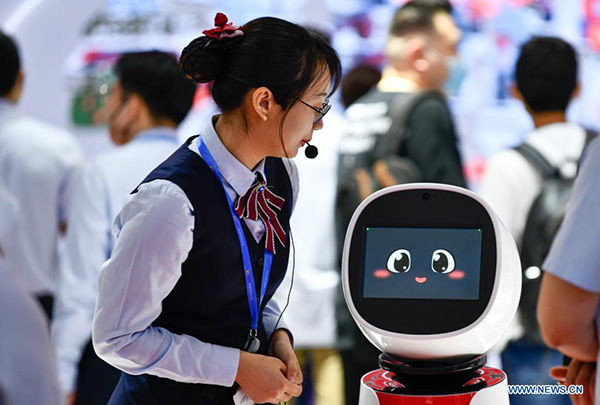
A staff member reacts with a robot at the fifth World Intelligence Congress at Tianjin Meijiang Conference and Exhibition Center in North China's Tianjin, on May 23, 2021. [Photo/Xinhua]
Businesses in China and elsewhere should step up efforts to use artificial intelligence-based technologies to drive manufacturing, industry experts and media professionals said in a webinar co-hosted by China Daily.
Most businesses are already embracing digital transformation to accelerate development, they said.
"We are racing to adopt AI technologies in several functions, but there are difficulties in production processes as well as in resource management," said Masahiro Nakamura, CEO of Lexer Research Inc.
Neale G. O'Connor, professor and head of the Department of Accounting of Monash University Malaysia, said a big challenge in some factories is the owner's mindset-many owners do not have a strategic vision to make it conducive for the factory to make top-class products.
O'Connor said: "They (factory owners) have gone from product to product, and aren't so focused on developing talent and skills in their organizations.
"A lot of factories today are at the continuous improvement stage. We need a lot more effort to move to the next stage of digitalizing so we can start to capitalize on the opportunities that AI brings us."
The Tianjin Municipal People's Government Information Office and the Asia News Network were the other co-hosts of the webinar. The online event's theme was "The Future of AI in Manufacturing Industries", and it attracted participation of the likes of Nakamura, O'Connor and other corporate, academic, media and research luminaries.
The webinar was held against a backdrop of China's big investments in AI-based technologies in industries like manufacturing, finance and transportation. Tianjin is one of the cities to advance AI-based technologies.
In 2018, Tianjin set up a 100 billion yuan ($15.48 billion) fund to invest in AI-based technologies. Another 30 billion yuan was added to the fund subsequently to help build the city into an advanced manufacturing research and development hub.
China's 14th Five-Year Plan (2021-25) sets benchmarks for the country's AI sector. The value of core AI-enabled industries is predicted to exceed 1 trillion yuan and make China a global leader in AI innovation by 2030.
Industry insiders said AI development in China and elsewhere is expected to transform manufacturing everywhere.
Chai Hua, senior reporter of business news at China Daily Asia Pacific, said AI development is primarily focused on talent, especially in the manufacturing sector, so placing emphasis on novel talent training models can help accelerate the cultivation of more AI talent in manufacturing.
Umar Saif, chief digital officer of Jang Media Group, said, "Machine-learning can help analyze all the information you need. Companies such as Coca-Cola have a need to get information from data. For every shop, they collect data so they can know what they should produce next month."
Ly Ly Cao, a reporter for Viet Nam News, said the past decades have witnessed huge improvements in Vietnam's technology development, as the market is a go-to destination for many investors now.
Wang Yu, a research fellow of the College of Intelligence and Computing of Tianjin University, however, said that for long, the manufacturing sector has paid attention to only manufacturing, but that may have been due to the notion that its systems and processes are not compatible with AI.
"The new AI models designed by the researchers are now being applied in the manufacturing sector; but for some complex scenes like manufacture of goods, we still have a long way to go. But we have a big market and hopefully it can go further in terms of technology and deep learning," he said.